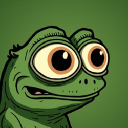-
 Bitcoin
Bitcoin $105,593.4578
-0.14% -
 Ethereum
Ethereum $2,501.8980
2.34% -
 Tether USDt
Tether USDt $1.0002
0.00% -
 XRP
XRP $2.3753
-0.92% -
 BNB
BNB $650.1803
0.52% -
 Solana
Solana $165.8921
-2.27% -
 USDC
USDC $0.9998
0.02% -
 Dogecoin
Dogecoin $0.2233
-1.98% -
 Cardano
Cardano $0.7411
-0.98% -
 TRON
TRON $0.2657
-0.31% -
 Sui
Sui $3.8277
-0.27% -
 Chainlink
Chainlink $15.7026
0.68% -
 Avalanche
Avalanche $22.0958
-2.17% -
 Stellar
Stellar $0.2856
-1.25% -
 Hyperliquid
Hyperliquid $26.4052
-0.73% -
 Shiba Inu
Shiba Inu $0.0...01452
-0.89% -
 Hedera
Hedera $0.1921
-1.05% -
 UNUS SED LEO
UNUS SED LEO $8.6233
-0.57% -
 Bitcoin Cash
Bitcoin Cash $390.8852
-3.19% -
 Toncoin
Toncoin $3.0165
-3.60% -
 Litecoin
Litecoin $98.2319
-0.87% -
 Polkadot
Polkadot $4.5759
-2.38% -
 Monero
Monero $340.9802
0.79% -
 Bitget Token
Bitget Token $5.1849
0.62% -
 Pepe
Pepe $0.0...01319
-0.78% -
 Dai
Dai $0.9998
0.00% -
 Pi
Pi $0.7365
-1.18% -
 Ethena USDe
Ethena USDe $1.0003
-0.04% -
 Uniswap
Uniswap $5.9124
-0.67% -
 Aave
Aave $239.5629
5.86%
how to buy crypto with amex credit card
Purchasing cryptocurrencies with an Amex credit card involves choosing a reputable exchange, linking the card, understanding transaction fees and risks, and evaluating the pros and cons of using this payment method.
Jan 31, 2025 at 03:36 am

How to Buy Crypto with Amex Credit Card: A Comprehensive Guide
Key Points:
- Exploring different exchanges that support Amex purchases for cryptocurrencies
- Understanding the process of purchasing crypto with an Amex credit card
- Evaluating potential fees and risks associated with using a credit card for crypto transactions
- Assessing the pros and cons of using an Amex credit card for crypto purchases
- Identifying alternative payment methods for buying cryptocurrencies
Step 1: Choosing the Right Exchange
- Begin by researching cryptocurrency exchanges that accept Amex credit cards.
- Consider factors such as fees, trading volume, security measures, and available cryptocurrencies.
- Reputable exchanges like Coinbase, Binance, and Gemini typically support Amex purchases.
Step 2: Creating an Account and Linking Amex Card
- Once you've chosen an exchange, create an account and complete the identity verification process.
- Navigate to the payment methods section and select the option to add a credit card.
- Input your Amex credit card details securely and authorize the connection.
Step 3: Initiating a Crypto Purchase
- Specify the cryptocurrency you wish to buy and indicate the amount or value.
- Select Amex credit card as your payment method and confirm the transaction.
- The exchange will typically process the request and execute the purchase within a short time frame.
Step 4: Understanding Fees and Risks
- Be aware that most exchanges charge a fee for using a credit card. This fee may vary depending on the exchange and the amount of the transaction.
- Using a credit card for crypto purchases can potentially incur additional interest charges if you do not pay off the balance promptly.
- It is important to assess your financial situation and consider the risks before using a credit card for crypto transactions.
Step 5: Pros and Cons of Using Amex
Pros:
- Convenience: Amex credit cards allow for quick and easy crypto purchases without needing to transfer funds beforehand.
- Rewards: Some Amex credit cards offer rewards points or cashback on cryptocurrency purchases.
- Security: Reputable exchanges typically employ robust security measures to protect user funds and transactions.
Cons:
- Fees: Credit card fees can be significant and increase the overall cost of your crypto purchases.
- Interest Charges: If you fail to pay off the credit card balance promptly, you may incur additional interest charges.
- Volatility: Cryptocurrencies are highly volatile, and their prices can fluctuate significantly, potentially leading to losses on your investments.
Step 6: Alternative Payment Methods
If using an Amex credit card is not suitable, consider alternative payment methods such as:
- Bank Transfer: Bank transfers are a slow but affordable way to fund your crypto purchases.
- Debit Card: Debit cards linked to your bank account can be used on some exchanges for crypto purchases.
- Third-Party Services: Companies like Simplex and MoonPay allow you to buy cryptocurrencies using credit cards but may charge higher fees.
FAQs
Q: Is it advisable to use a credit card to buy cryptocurrencies?
A: Using a credit card for crypto purchases can be convenient, but it is crucial to carefully consider the fees and risks involved.
Q: What are the potential risks of using an Amex credit card for crypto?
A: The main risks include transaction fees, interest charges, and the volatility of cryptocurrencies.
Q: Are there any reputable exchanges that support Amex purchases?
A: Yes, established exchanges like Coinbase, Binance, and Gemini allow users to buy cryptocurrencies with their Amex credit cards.
Q: How can I avoid excessive fees when buying crypto with Amex?
A: Compare fees across different exchanges and consider using alternative payment methods like bank transfers or debit cards.
Q: What are the advantages of using an Amex credit card for crypto purchases?
A: Convenience, potential rewards, and robust security measures offered by reputable exchanges.
Disclaimer:info@kdj.com
The information provided is not trading advice. kdj.com does not assume any responsibility for any investments made based on the information provided in this article. Cryptocurrencies are highly volatile and it is highly recommended that you invest with caution after thorough research!
If you believe that the content used on this website infringes your copyright, please contact us immediately (info@kdj.com) and we will delete it promptly.
- Are you ready to ride the next wave of meme coin mania?
- 2025-05-20 06:25:13
- Bitcoin (BTC) price rebounds over 3 percent after breaking out of a symmetrical triangular pattern
- 2025-05-20 06:25:13
- JPMorgan Chase (JPM) Allows Clients to Purchase Bitcoin (BTC), CEO Jamie Dimon Remains a Skeptic
- 2025-05-20 06:20:14
- Opera MiniPay Stablecoin Wallet Expands to iOS, Opening Up New Markets
- 2025-05-20 06:20:14
- Ethereum (ETH) price sees correction, but analysts remain optimistic
- 2025-05-20 06:15:13
- Circle is exploring potential acquisitions, primarily by Coinbase, according to Fortune.
- 2025-05-20 06:15:13
Related knowledge

What is Ethereum’s Slashing mechanism and how to punish malicious behavior?
Feb 20,2025 at 03:08am
Key PointsOverview of slashingDifferent types of slashing in EthereumIncentives and consequences of slashingIdentifying and reporting slashed validatorsOngoing discussions and potential improvementsEthereum's Slashing Mechanism: Punishing Malicious BehaviorEthereum's slashing mechanism is an essential tool for ensuring network security and punishing mal...

What is the verifier node of Ethereum and how to become a verifier?
Feb 19,2025 at 06:00pm
The Verifier Node of Ethereum: A Comprehensive GuideKey Points:What is a Verifier Node?How to Become a Verifier NodeResponsibilities and Rewards of a Verifier NodeMinimum Requirements for Becoming a Verifier NodePotential Difficulties in Running a Verifier Node1. What is a Verifier Node?A Verifier Node is an independent entity on the Ethereum network th...

What is Ethereum’s staking, and how to participate and earn money?
Feb 19,2025 at 04:37pm
Key Points:Understanding Ethereum's Staking MechanismSteps to Participate in StakingBenefits and Rewards of StakingSecurity and Risk ConsiderationsTechnical Requirements and Hardware OptionsPotential Challenges and Troubleshooting TipsFAQs on Ethereum StakingWhat is Ethereum's Staking?Proof-of-Stake (PoS) is a consensus mechanism used in blockchain netw...

What is Ethereum’s DAO (Decentralized Autonomous Organization) and how does it work?
Feb 20,2025 at 03:12am
Key PointsDefinition and Structure of a DAOGovernance and Decision-Making in DAOsBenefits and Use Cases of DAOsChallenges and Limitations of DAOsWhat is Ethereum's DAO (Decentralized Autonomous Organization) and How Does It Work?Definition and Structure of a DAOA Decentralized Autonomous Organization (DAO) is an innovative governance and management fram...

What is Ethereum's multi-signature wallet and how to improve security?
Feb 20,2025 at 02:18pm
Key Points:Understanding the Concept of a Multi-Signature WalletBenefits and Drawbacks of Multisig WalletsRequirements for Setting Up a Multisig WalletStep-by-Step Guide to Generating a Multisig WalletImplementing Strategies for Enhanced Security1. Understanding the Concept of a Multi-Signature WalletA multi-signature (multisig) wallet in the Ethereum e...

What is Ethereum's oracle and how to provide data for smart contracts?
Feb 21,2025 at 01:30am
Key Points:Understanding the concept of oracles in EthereumExploring different types of oraclesDetailed guide on how to provide data for smart contractsAddressing potential challenges and considerationsWhat is Ethereum's Oracle?Oracles are crucial components in the Ethereum ecosystem, enabling smart contracts to access real-world data and off-chain even...

What is Ethereum’s Slashing mechanism and how to punish malicious behavior?
Feb 20,2025 at 03:08am
Key PointsOverview of slashingDifferent types of slashing in EthereumIncentives and consequences of slashingIdentifying and reporting slashed validatorsOngoing discussions and potential improvementsEthereum's Slashing Mechanism: Punishing Malicious BehaviorEthereum's slashing mechanism is an essential tool for ensuring network security and punishing mal...

What is the verifier node of Ethereum and how to become a verifier?
Feb 19,2025 at 06:00pm
The Verifier Node of Ethereum: A Comprehensive GuideKey Points:What is a Verifier Node?How to Become a Verifier NodeResponsibilities and Rewards of a Verifier NodeMinimum Requirements for Becoming a Verifier NodePotential Difficulties in Running a Verifier Node1. What is a Verifier Node?A Verifier Node is an independent entity on the Ethereum network th...

What is Ethereum’s staking, and how to participate and earn money?
Feb 19,2025 at 04:37pm
Key Points:Understanding Ethereum's Staking MechanismSteps to Participate in StakingBenefits and Rewards of StakingSecurity and Risk ConsiderationsTechnical Requirements and Hardware OptionsPotential Challenges and Troubleshooting TipsFAQs on Ethereum StakingWhat is Ethereum's Staking?Proof-of-Stake (PoS) is a consensus mechanism used in blockchain netw...

What is Ethereum’s DAO (Decentralized Autonomous Organization) and how does it work?
Feb 20,2025 at 03:12am
Key PointsDefinition and Structure of a DAOGovernance and Decision-Making in DAOsBenefits and Use Cases of DAOsChallenges and Limitations of DAOsWhat is Ethereum's DAO (Decentralized Autonomous Organization) and How Does It Work?Definition and Structure of a DAOA Decentralized Autonomous Organization (DAO) is an innovative governance and management fram...

What is Ethereum's multi-signature wallet and how to improve security?
Feb 20,2025 at 02:18pm
Key Points:Understanding the Concept of a Multi-Signature WalletBenefits and Drawbacks of Multisig WalletsRequirements for Setting Up a Multisig WalletStep-by-Step Guide to Generating a Multisig WalletImplementing Strategies for Enhanced Security1. Understanding the Concept of a Multi-Signature WalletA multi-signature (multisig) wallet in the Ethereum e...

What is Ethereum's oracle and how to provide data for smart contracts?
Feb 21,2025 at 01:30am
Key Points:Understanding the concept of oracles in EthereumExploring different types of oraclesDetailed guide on how to provide data for smart contractsAddressing potential challenges and considerationsWhat is Ethereum's Oracle?Oracles are crucial components in the Ethereum ecosystem, enabling smart contracts to access real-world data and off-chain even...
See all articles

























































































